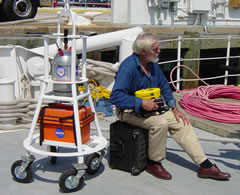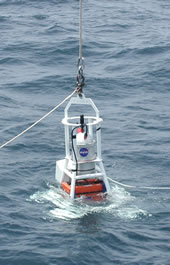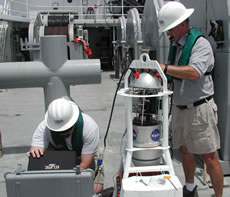|
 |
 |
 |
 |
|
Daily
At-Sea Logs May 7th, 2003 |
May 7,03
Passive Acoustic Monitoring System The Passive Acoustic Monitoring System project, PAMS, began a year and a half ago at NASA’s Kennedy Space Center. An idea created by Dr. Grant Gilmore and worked up in conjunction with Mike Lane and Steve Van Meter has come a long way in a short time, the project is already in its second phase.  The
idea behind the PAMS originally was to acoustically monitor fish
spawning through specific acoustic signatures of species communication
and to assess a possible impact to NASA shuttle launches. Each fish
like a cat’s meow or a dog’s bark has a specific acoustic
signature and communicates with other fish of the same species.
Already it has been found that there is no major impact on the noise
produced by shuttle launches and local fish spawning. The project's
focus has now broadened to include monitoring of fish populations
(including endangered species), spawning behaviors and seasonality.
There is also a possibility for using the in homeland port security
applications. The
idea behind the PAMS originally was to acoustically monitor fish
spawning through specific acoustic signatures of species communication
and to assess a possible impact to NASA shuttle launches. Each fish
like a cat’s meow or a dog’s bark has a specific acoustic
signature and communicates with other fish of the same species.
Already it has been found that there is no major impact on the noise
produced by shuttle launches and local fish spawning. The project's
focus has now broadened to include monitoring of fish populations
(including endangered species), spawning behaviors and seasonality.
There is also a possibility for using the in homeland port security
applications. (at left: Dr. Grant Gilmore with the PAMS) The term
"passive" in PAMS means there are no sounds emitted from
the unit that may interfere with local During our current testing we will be deploying three PAMS units. The reason for three units is to triangulate the specific location of whatever fish are being monitored. This will also allow the fish to be physically tracked so that for example the interactions of multiple male groupers courting a female grouper can be physically tracked while their calls and interactions are recorded. Divers from United Space Alliance will deploy the three units in approximately one hundred feet of water. After the units reach the bottom they will be arranged in an isosceles triangle.45 degrees and 135 degrees from the first unit at fifty meters distance. The units can record sound in a .wav file for three days, twenty four hours a day. We’re all very excited to see the results from this extraordinary field test.
|
 wildlife.
The PAMS unit is used strictly for listening. A hydrophone, an underwater
microphone, listens to the sounds in surrounding waters over distances
of up to two hundred yards. The unit also measures temperature,
salinity and depth. These three factors affect the way sound will
travel in water. Another unique feature of the PAMS is that it is
rated to perform to a depth of a thousand meters, over three thousand
feet.
wildlife.
The PAMS unit is used strictly for listening. A hydrophone, an underwater
microphone, listens to the sounds in surrounding waters over distances
of up to two hundred yards. The unit also measures temperature,
salinity and depth. These three factors affect the way sound will
travel in water. Another unique feature of the PAMS is that it is
rated to perform to a depth of a thousand meters, over three thousand
feet.  Once
the development phase of PAMS is complete, the technology will be
used to install a network of monitors in the lagoon waters of the
Kennedy Space Center connected by a wireless ethernet system for
realtime monitoring of fish populations and water environmental
factors. The possibilities for using PAMS technology for homeland
security at deepwater ports for detection of divers is also in the
plans.
Once
the development phase of PAMS is complete, the technology will be
used to install a network of monitors in the lagoon waters of the
Kennedy Space Center connected by a wireless ethernet system for
realtime monitoring of fish populations and water environmental
factors. The possibilities for using PAMS technology for homeland
security at deepwater ports for detection of divers is also in the
plans.